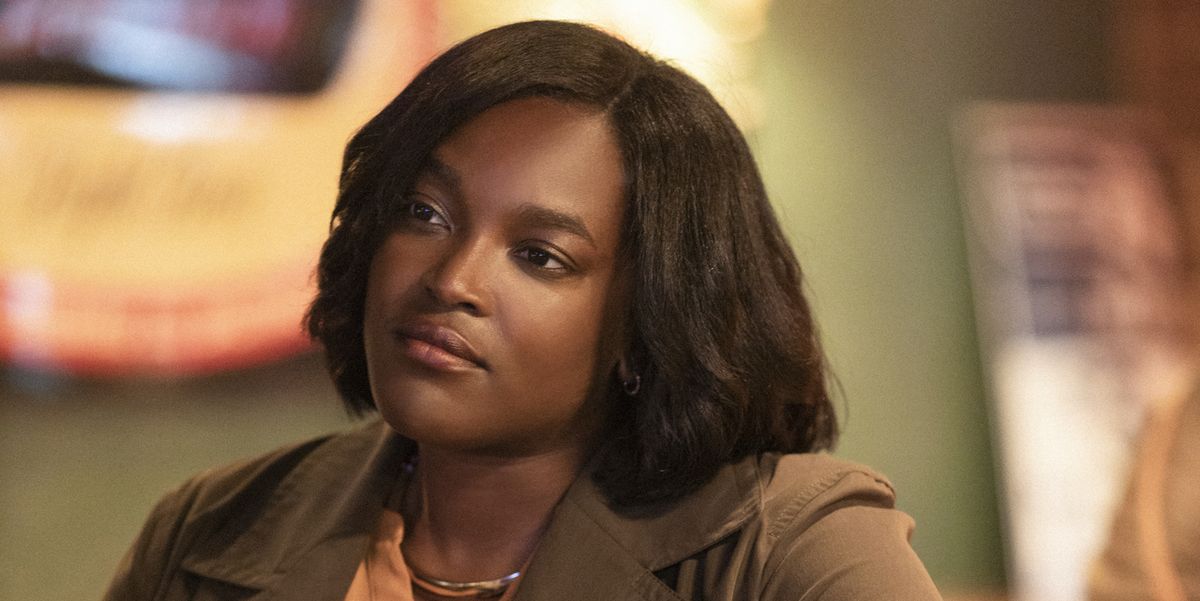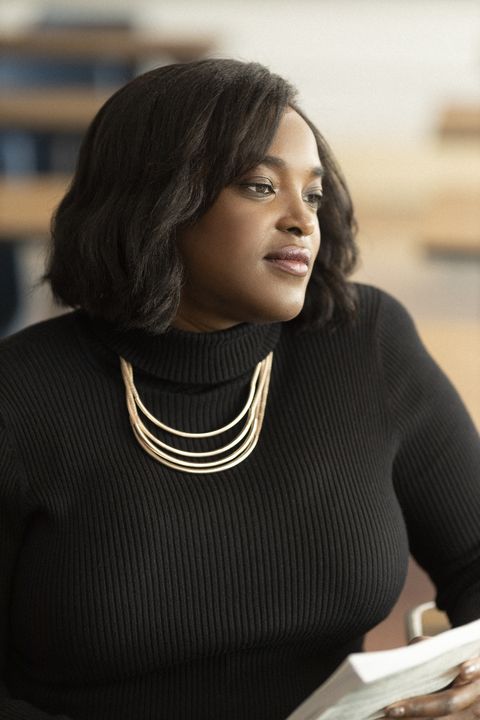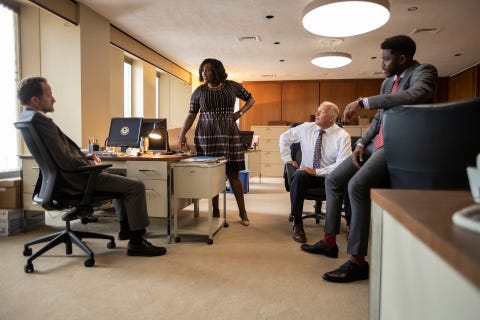Products You May Like
To watch, in real time, Wunmi Mosaku grasp at hope is to witness an uncanny echo of her work onscreen. In Lovecraft Country, Luther, and even Loki, the Nigerian-British actress plays characters grappling with the ugly reality before them: Do they work to topple the system, or learn to survive within it? Perhaps no role of Mosaku’s has better illustrated that battle than Nicole Steele on HBO’s We Own This City, executive producer and writer David Simon’s spiritual successor to his beloved crime drama The Wire.
In We Own This City, which aired its series finale on Monday night, Mosaku plays Nicole, a Department of Justice attorney within the Civil Rights Division who’s tasked with drawing up a consent decree with the City of Baltimore. In essence, the document would outline the Baltimore Police Department’s long history of abuse, and the decree would require the city to institute police reform. Based on the book of the same name and the real-life events surrounding it, We Own This City follows BPD’s Gun Trace Task Force, from which eight officers are eventually convicted on corruption charges. Through interviews inside and outside of the BPD, Nicole works to piece together a significant case for reform episode by episode—only to recognize just how little will change if she does.
Earlier in the series, Nicole insists she doesn’t need to make her battle for civil rights “her everything.” To some degree, she has the luxury of patience: She was raised in a WASP-y neighborhood outside of Washington, D.C. and didn’t share the ugly experiences with police that forever tainted her brother’s perception of them. But as the show progresses, Nicole’s carefully restrained fury is made more and more visceral. She realizes that, to stay in the fight, it must become your everything. And even then: It might be a fight that’s impossible to win.
During one particularly poignant scene, a police academy instructor tells Nicole what she already knows—but is struggling to accept—about the War on Drugs: “Is the Justice Department or even the Office of Civil Rights ready to declare that we long ago lost this war? That we’ve achieved nothing but full prisons and routine brutality and a complete collapse of trust between police departments and their cities?”
By the time the finale rolls around, the Trump Administration is incoming, and Jeff Sessions “wants to arrest everyone he can for fuckin’ marijuana possession,” Nicole tells a colleague, her voice breaking for the first time all season. As she’s on the verge of trembling, she insists, “I’ll never make it four years.” Such a declaration, though made in the sway of emotion, nevertheless serves as prophecy: Nicole ends up resigning from her position at the DOJ, a move that her colleague and protege, Ahmed, views as cruelly cynical. Is she saying none of their work matters? That they should just give up? Putting a hand on Ahmed’s shoulder and leaning in close, Nicole cooly says, “What I’m saying is, it’s your turn, motherfucker.”
But Mosaku knows that passing the baton isn’t a clean getaway for Nicole. As we discuss the current state of police reform in 2022, Mosaku’s face twists; she repeatedly stops and restarts her sentences, often at a loss for what to say next. Only days prior to our interview, a gunman had shot and killed 10 Black people in a supermarket in Buffalo, New York, an act investigated as a racist hate crime. A few days later, a mass shooting at an elementary school in Uvalde, Texas, would soon reveal shocking inaction from the city’s police department during the massacre.
“It just feels like not enough has changed,” Mosaku says. “It sometimes makes me feel a little hopeless.”
And yet the actress feels these stories, for all the trauma they stir up, are essential to the fabric of American culture: “I feel like it’s just so urgent, this topic of, ‘Who is policing us? What do they do with that position of power and authority? Whose human rights are valued? And whose dignity is valued? Whose safety is valued? Whose lives are valued? Whose hopes and dreams are valued?’’ she says. Below, Mosaku talks through the We Own This City finale—and what the city of Baltimore taught her as an actress and human being.
Unlike other characters in this series, Nicole wasn’t based on anyone in real life. So what went into crafting her? What research did you do to make her feel real?
I mean, I do the same thing with all of my characters, whether it’s a person who’s real or not. It’s to figure out who they were before we meet them, because we’re a product of everyone we’ve ever met, every experience we’ve ever had. So it was understanding what a a Black girl from Bethesda, who grew up with her father as a lawyer in a neighborhood where she was one of very few, if any, Black people; whose brother had been terrorized by the police; who had an idea of what justice meant, and tried to live towards that…I had to understand the justice system in the States and figure out why she pivoted, before we meet her, to the civil rights division and why she pivots again.
But I think Nicole is basically, like, the audience within the show. I hope she’s asking the same questions as the viewers watching at home. “How did this happen? Why did this happen? And how can we stop this from happening again?”
I thought it was interesting that we don’t get much about Nicole’s history until the penultimate episode. Only then do we learn that she used to prosecute drug cases and that her brother had these racist experiences at the hands of police. From your perspective, why do you think it was important for the audience to learn these details later, as opposed to right when we meet her?
I guess because it’s not about her, maybe. Maybe this is a very big generalization, but I would say most Black people have a relationship with law enforcement in some way, whether it’s a fear, an inherent fear, or a direct conflict. It’s a relationship that is strained and painful and scary. I feel like you could look at [Nicole] and think, Oh, she’s put together. And she feels confident in these spaces. But still, even though she said she had it a lot easier than her brother, the residue of what happened with her brother still permeates her life.
I guess I don’t know why [the writers] waited that long. The only thing I can think of is that it’s not about my character. It’s not my story. But I think it was put in there to maybe show that it doesn’t matter how high you fly, there is still a tension. The tension is the repercussions of centuries of oppression. It vibrates on a cellular level throughout the whole community, that a grief felt here on the East Coast is absolutely felt on the West Coast.
Something that really struck me about your performance in this series is how it moves from one end of the spectrum to the other, incrementally, throughout each episode. Nicole starts out confident and steady. By the finale, she’s cursing; she’s almost on the verge of tears; she ends up resigning. How did you go about demonstrating that shift in her over time, without, in a sense, clueing the audience into what was happening?
I just read the scripts over and over. And I kind of charted where she was. She’s trying to change things on a federal level. And she realizes that the only way things are going to change is if it’s like… We’re talking from the top down. This consent decree will only do so much. The whole system needs to change. I mean, she’s just one person. It doesn’t matter how fit you are, you run on a treadmill and you will get tired. And you do have to hit the emergency stop in order to preserve yourself.
That leads me into my next question, because I thought that scene where Nicole tells Ahmed, her colleague, “It’s your turn, motherfucker,” you delivered so beautifully. But I’m curious, what did that scene represent to you?
I mean, for me, I look at activists and freedom fighters, and I think of them as gods, demigods. I’m so grateful, so grateful, because without them, I wouldn’t have the freedoms that I experience. And I know we’re nowhere near where we need to be, but I look at these people and they stuck their head above the precipice and they became a target. And this is every single person who advocates for equality and humanity and the dignity of people. Without them, we wouldn’t be where we are.
[Nicole] gets to bow out. She’s not assassinated. She’s not killed. When we gain more rights for a certain person, type of person, or whatever, really what we’re doing is opening up for everyone to have more rights with that…But I do think it’s that feeling of like…You have to pass the baton on. At the same time, she’s very blessed to be able to walk away from her part in it. Lots of people aren’t given that opportunity.
I think there’s two different lenses through which you could view Nicole’s resignation. You could view it as a tragic thing: This system is so broken that nothing can ever fix it, and this was a casualty of that. Or you can see it the way you’re describing: It’s a triumph. Nicole escapes intact. She gets to take care of herself and pass the baton. Which do you view it as?
I don’t think it’s tragic. I think it’s tragic that it’s not finished, that the job isn’t done. We haven’t achieved equality. That’s tragic. But I look at her and I think, “Okay. You did as much as you could.” Now, I want her to enjoy. I want her to be at peace. I’m not saying that leaving the job will give her peace. But also, I think that it’s not for just a few people to burn themselves out. It’s for all of us. [The work of justice] is too much for one person. It’s too much for the civil rights office. It’s too much. It has to be a shared burden for us to actually achieve equality if that’s what we truly want.
I don’t see it as a bad thing that she leaves. Especially with the state of the world and the tragedy that we see on a day to day basis with white supremacy and violence and the evil that Black people have to face on a day-to-day, I feel like that trauma is huge and a heavy weight for everyone to bear. And I feel like it should be someone else to do this job. If you already have to deal with all of the stuff that we have to deal with on a day-to-day, to then also be the people trying to fight? It’s a lot.
It’s interesting how this series ends just as the Trump administration is coming in. This whole event takes place prior to George Floyd’s death, the Black Lives Matter protests of 2020, and the way that, as you’ve mentioned several times, had a ripple effect around the globe. So, looking back on the series now, what do you think it represents in the national conversation about policing and Black lives? Did knowing what was coming shift how you viewed this show?
It’s interesting because I have to think about it from when I read [the scripts]. I read them in 2021, so after the global reckoning in 2020. I feel like…Reading it and knowing where we are, I mean, it just feels like not enough has changed.
It sometimes makes me feel a little hopeless that something as big as [the 2020 protests] can happen. After the murder of George Floyd, after this huge global racial reckoning, that anyone could still kill and brutalize unarmed Black people, it just shows to me that I…It blows my mind that you’ll have this huge moment that will be written about in history and still nothing changed. I don’t know. I read the scripts after all of that and I was like, “This needs to be told, and maybe someone will feel, like, that it’s not just a ‘bad apple’ or this or that. It’s a systemic thing. Maybe someone who feels safe with the police might now advocate for all of us to feel safe with the police.”
I can only hope that someone’s heart has changed, one person at a time, because these huge global-changing moments happen, and still we get the same. If one person… [Shakes her head.] One is too little. One is too little. But at least one person feels emboldened to change and move toward helping, then that matters. That does matter. And that means that what we’ve done means something.
But the reality that we’re living in, nothing’s changed. So, yeah. I don’t know. I don’t really know how to answer that other than not enough has changed.
How did your experience on the set of this show shape you as an actress? What did it mean to you, as a sum of its parts?
I think being in Baltimore, and being surrounded by the amazingly strong and resilient and loving people of Baltimore, and seeing the wounds that this police force have left, and how the people have continued through the pain and the atrocities, I feel like that resilience and strength was very humbling. Because they really welcomed us in. They really wanted us to tell their story. And just being around people who have actually been affected and still have their humanity and their grace intact is quite an extraordinary thing to witness, because it shows just the depth of humanity within us, as a people.
The anger and the pain can be there, but it doesn’t mean you lose the good stuff, too. I think that, for me, was a huge thing to really witness and be surrounded by, because so many people on our set had been victims of [police violence], or had family members, friends, who had been there at the uprising [after Freddie Gray’s killing]. These people lived it and still have this huge capacity for love and compassion. And haven’t been ruined by it.
This interview has been edited and condensed for clarity.
This content is created and maintained by a third party, and imported onto this page to help users provide their email addresses. You may be able to find more information about this and similar content at piano.io



